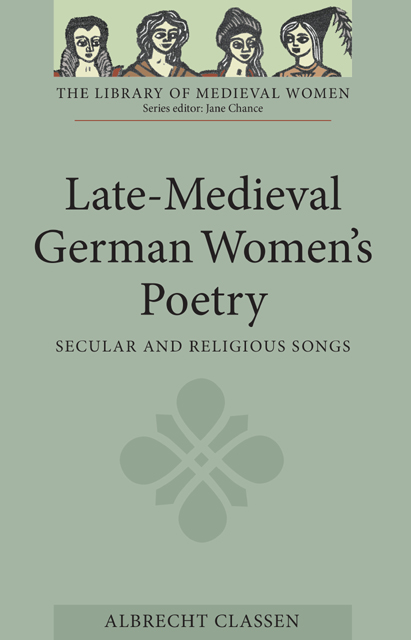Book contents
Interpretive Essay: The Rediscovery of Women’s Voices through the Investigation of Hitherto Ignored Sources
Published online by Cambridge University Press: 17 March 2023
Summary
Did late-medieval women actually compose love poetry?
With few exceptions medieval courtly love poetry was, perhaps not so surprisingly, dominated by male poets. This has been, by and large, the conclusion drawn by most literary historians until very recently. Although the Old Norwegian and Old Icelandic Skáldonur (tenth and eleventh centuries) and the Old Occitan troubairitz (Southern France, or Provence, first half of the twelfth century)—both terms signifying women poets—experienced a short period of flowering, their influence did not last for long, and they did not find followers in any other European medieval language as far as modern scholarship has been able to ascertain. Certainly, we often hear female voices, that is, male poets’ thinly veiled masks utilized to expand their poetic repertoire, but these poems cannot be identified as contributions by women authors. Maaike Meijer’s attempt, for instance, to accept female voices within medieval Dutch dawn songs as evidence for female poetry to some extent ignores the constraints of a literary genre and represents more wishful thinking than historical fact. Quite understandably, Meijer, like many other traditional scholars, commits the fallacy of accepting a fictional female voice within a traditional dialogic genre as a reflection of a literary-historical fact without considering the context and the extenuating social-historical circumstances. Similarly, optimistic claims by feminist scholars such as Susan Boynton that “women performed their own music or adapted the music of others to their own taste and requirements,” so far represent mostly fascinating but not sufficiently documented hypotheses and are not supported by textual evidence, unless we accept Boynton’s conclusion: “the documented activities of noblewomen and their ladies-in-waiting suggest that they created music and poetry which is lost, or extant but anonymous.” It is true, however, that medieval courtly literature contains many intriguing references to professional female musicians and highly trained aristocratic women performing songs and playing musical instruments, such as Isolde in Gottfried of Strassburg’s Tristan, a jongleur’s sister in Guillaume de Dole, Nicolette in Aucassin et Nicolette, many of the ladies in Boccaccio’s Decameron, and Tarsia, Apollonius’s daughter in the enormously popular Apollonius of Tyre. But did noble courtly women also compose poetry, write romances, and create art works? Did they have the education, financial support, and public approval?
- Type
- Chapter
- Information
- Late-Medieval German Women's PoetrySecular and Religious Songs, pp. 113 - 140Publisher: Boydell & BrewerPrint publication year: 2004



